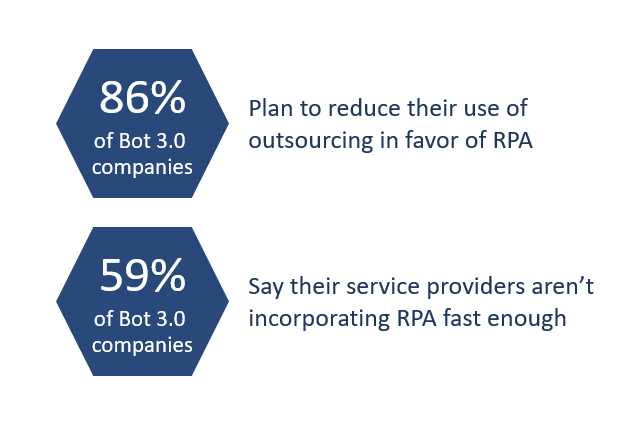Enterprises looking to reduce the cost of ongoing application production support are embracing robotic process automation (RPA) in their applications management services (AMS) outsourcing relationships. Many are finding that sourcing without the appropriate contract language to govern the development and support of RPA can be risky, causing them to lose out on potential savings from RPA or forgo their rights to use a bot if they change service providers. An enterprise also needs to strike a careful balance between requiring such stringent oversight of the RPA software development lifecycle (SDLC) that it impedes the automation’s release and such little oversight that it introduces risk to its production environment.
Enterprises should update their contract language now to make the most of automation, customize their SDLC specific to the development and implementation of bots, protect themselves and prepare for the future.
Whether a company needs to modify a current AMS contract to include RPA for the first time or is considering including RPA in a new AMS contract, the following questions apply:
- What path through the SDLC do we use to minimize risk and maximize productivity? Comprehensive SDLC processes and protections don’t always apply and can even hinder deployment of RPA. Contracts should specify how provider change management integrates with IT as well as how automations are monitored and supported.
- Who owns the RPA bot, its enabling code and the work steps associated with the enabling code once it is created? Enterprises can build automations using RPA tools on their own or via service providers – or both. Keep in mind that service providers may choose to re-use automations from other clients, so intellectual property (IP) ownership can become complicated. Enterprises and service providers should spend time during contract negotiations to come to consensus about the fundamental aspects of IP ownership.
- Where does funding of the RPA development and maintenance come from? Automations often originate outside of IT, the organization that often oversees umbrella AMS contracts. The funding for the development and ongoing support and maintenance of the bots should be tied to the unit that realizes the savings derived from automations.
- How do we assign gainsharing of the savings that result from the RPA in production? Language in sourcing contracts should state precisely how automation results will be measured and how the savings gained from improved productivity will be shared between the enterprise and service provider.
A recent ISG white paper What You Need to Know about Including RPA in your AMS Managed Services Contract explores in detail how to address these four critical questions in new and existing AMS sourcing contracts. Meanwhile, recent ISG research Is Your RPA Program Bot 3.0 Ready? shows that, while seven percent of enterprises use IT service providers as a source of bots, more than half of all enterprises think their service providers aren’t incorporating RPA fast enough. Enterprise automation leaders also told ISG that over the next three years automation will repatriate between 10 and 25 percent of work currently done offshore, and companies farther along in the RPA journey will build and support their bots themselves instead of using managed services providers (Figure 1).
Figure 1: Bot 3.0 Companies Often Move More Quickly Than Their Providers

Source: ISG Insights 2018 Bot 3.0 Study, n=321
Most new managed services agreements will have a substantial automation component to them – providers can no longer compete without it. Therefore, services buyers should think about how this will impact their provider evaluations and negotiations. To reduce risk, enterprises should scrutinize existing AMS contracts, modifying them as necessary to support new automations and ensure new contract terms fully address automations.
Associated Insights
Enterprises Need AI Skills to Get the Most Out of Automation
Is Your RPA Program “Bot 3.0” Ready?
Realizing the Full Value of Intelligent Automation in Workplace Managed Services
